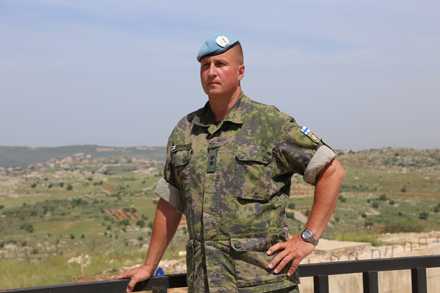Active reporting plays a key role for Finnish contingent in UNIFIL

United Nations (UN) Charter’s Chapter six deals with the peaceful settlement of disputes. UNIFIL mission is an example of a traditional peacekeeping operation that falls under Chapter six. UNSC Resolution 1701 (2006) defines the tasks and mandate of the operation. Restrictions on the use of force are based on the nature of the tasks.
Finnish-Irish battalion is considered as professional on its area of operation in southern Lebanon. It is also the only multinational battalion in the operation. UNIFIL operation’s tasks include monitoring the cessation of hostilities particularly on the blue line, to support the Lebanese armed forces and local authorities as well as to assist the local population.
The battalion carries out its tasks by patrolling. The battalion has reached full operational capability (FOC) within the prescribed period and it has carried out its tasks under the mandate at a good level.
- The battalion has kept its own level and we have fulfilled our turn. The next rotation will have a good start here, says battalion commander Lieutenant Colonel Kari Kaakinen.
Pori Brigade Crisis Management Centre provides pre-deployment training for Finns and Estonians. When the contingent arrives at the area of operation, all the procedures are merged with the Irish troops. A comprehensive and long-term training establishes the suitability, both at home and in crisis management operations around the world.
To achieve the compatibility requires the identification of the various interfaces and daily observations. The performance and capacity of the Finnish-Irish battalion is a result of active internal training as well as cooperation with other battalions, Sector Mobile Reserve (SMR) and Force Commander Reserve (FCR) troops. Lessons Identified - lessons learned - process also provides feedback. The result is ‘best practices’.
The reports and evaluation activities indicate the success. Reporting about overflights or armed persons on Blue Line is based on tasks according to the Resolution 1701 (2006). The battalion reports all their findings to the upper headquarters and all the exercises are evaluated. The battalion has consistently received good feedback on the performance level of the various exercises.
The battalion has been active in the civil-military cooperation (CIMIC). CIMIC-projects are part of the creation of the acceptability on the region and the role is to support the military operations. The projects are created in accordance with the objectives of the UNSC Resolution 1701.
- The themes of the projects this year are water and electricity. The objective is to create such conditions to the society so it can develop in a long time span. On the other hand projects are to encourage municipalities and citizens and operators to take responsibility for themselves.
Some of the projects are carried out with the Foreign Ministry or any other national source of funding. Some assistance can be done also as low-cost-projects. During the year, the battalion has given for instance first-aid awareness training for locals.
MIMIC activities (military-military-cooperation) are also a solid part of Finnish-Irish Battalion’s work. Resolution 2236 created the concept of a Strategic Dialogue. Finnish Ministry of Foreign Affairs supports Lebanese Armed Forces in the framework of Strategic Dialogue as a part of the UN efforts.
- We carry out the mission here in accordance with the political decision-making. Military crisis management is one of the means of exerting political influence.
It’s 10 years since the war and there is still shortage for water and electricity on the area. On the other hand the country has since last summer been in a middle of a waste crisis, that seems to continue without any solution. The topic has a strong political dimension. The battalion keeps on continuing tasks given by upper level.



